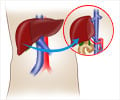Frequently Asked Questions
1. Which doctor do I consult if I have a liver problem?Your Primary Care Physician will often first refer you to a Gastroenterologist if a liver problem is suspected. If a specific liver disease is identified, then it is best to seek consultation with a liver specialist (Hepatologist). In the case of liver disease that may require transplantation then the Hepatologist will refer to a liver transplant center for evaluation by the Transplant Surgeon and the rest of the team.
2. Who Determines What Patients Receive a Liver Transplant?
Each transplant center should have a Liver Transplant Selection Committee composed of Surgeons, Hepatologists and other transplant professionals to determine if a patient is suitable for being placed on the liver transplant waiting list. Selection criteria can be institution specific, but all centers try to maximize their patient outcomes by refusing to transplant patients who have a predicted poor postoperative survival (e.g., history of cancer, severe cardiovascular disease or certain chronic or active infections, etc.).
3. Where can I find donors for Living donor Liver Transplantation?
By law in India, living liver donors must be related to the recipient either by marriage or they must be close family relatives. Strict policies are followed to maintain the highest ethical and legal standards.
4. Who can be considered to be a living liver donor?
Living liver donors must be exceptionally fit. A complete medical check-up including imaging studies (e.g., MRI, CT scan and/or Ultrasound) and blood tests ensure the absence of underlying diseases such as fatty liver disease, heart or lung disease, diabetes, high blood pressure, cancer and gynecologic issues in the case of women donors. The donor and recipient must be blood type compatible and size compatible. If the donor is much smaller than the recipient, the donated liver segment will not be large enough to function properly in the recipient. If too much liver tissue is removed from the donor, the donor risks liver failure. In addition, a thorough psychosocial evaluation is carried out between the donor, transplant psychiatrist, social worker and living donor advocate. This is to ensure that the donor truly wants to donate and that there is no coercion (emotional or financial) involved. The donor needs to be emotionally prepared for the possibility of complications or transplant failure in the recipient, as well as the donor risks of surgery.
5. What are the risks to the donor from the surgery?
The estimated risk of a donor dying during or shortly after surgery is 0.2-0.4%.
6. What is the recovery process like for the donor?
Liver donors usually spend 5 to 7 days in the hospital after surgery. Complete recovery with return to normal daily living can take anywhere between 1-3 months. Since the liver has the capacity to regenerate in a short period of time (1-3 months)
7. What is the cost of Liver Transplantation?
It depends on the country where such transplantation is taking place. However in many countries it is covered under the health insurance scheme.
In a private set up the cost can be anything from US $100,000 to 200,000
In India, a liver transplant can cost as little as Rs. 0.7 million in a public sector hospital but most centers charge anywhere between Rs.3 to 7 million.
Liver transplantation is an expensive surgery because of the critical care (ICU) costs before and after the operation, the specialized equipment and supplies needed during the surgery and the costly medicines used to prevent and treat rejection and transplant related infections.






